286 scholarly books by Haus Publishing and 28
start with B
286 scholarly books by Haus Publishing and 28
286 scholarly books by Haus Publishing
28 start with B start with B
28 start with B start with B

Baldwin
Anne Perkins
Haus Publishing, 2006
Prime Ministers Series, Baldwin was at the helm during the General Strike and the Abdication.
[more]
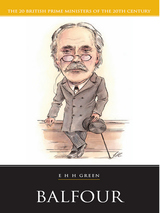
Balfour
Ewen Green
Haus Publishing, 2006
Prime Minister known for announcing "that Britain favoured a homeland for the Jewish People in Palestine."
[more]

Balzac's Omelette
A Delicious Tour of French Food and Culture with Honore de Balzac
Ankha Muhlstein
Haus Publishing, 2012
‘Tell me where you eat. what you eat, and at what time you eat, and I will tell you who you are.’ This is the motto of Anka Muhlstein’s erudite and witty book about the ways food and the art of the table feature in Honoré de Balzac’s writing.
It is not a coincidence that Balzac was the first in French literature to tackle this appetizing topic. Before the French Revolution, a traveller in France was apt to find local food scarce, tasteless and of dubious appearance. Restaurants did not even exist! Just as the art of the table became a centrepiece of French mores, Balzac used it as a connecting thread in his novels, showing how food can evoke character, atmosphere, class and social pretensions. Full of insights, Balzac’s Omelette invites you to taste anew French literature and cuisine.
It is not a coincidence that Balzac was the first in French literature to tackle this appetizing topic. Before the French Revolution, a traveller in France was apt to find local food scarce, tasteless and of dubious appearance. Restaurants did not even exist! Just as the art of the table became a centrepiece of French mores, Balzac used it as a connecting thread in his novels, showing how food can evoke character, atmosphere, class and social pretensions. Full of insights, Balzac’s Omelette invites you to taste anew French literature and cuisine.
[more]
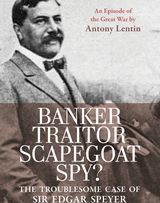
Banker, Traitor, Scapegoat, Spy?
The Troublesome Case of Sir Edgar Speyer
Antony Lentin
Haus Publishing, 2013
Sir Edgar Speyer was a conspicuous figure in the financial, cultural, social and political life of Edwardian London. Head of the syndicate which financed the construction of the deep "tube lines" and "King of the Underground", he was also a connoisseur and active patron of the arts who rescued the "Prom" from collapse, enhanced the nation's musical and artistic life at his own expense and directed the funding of Captain Scott's Antarctic expeditions. Speyer and his wife, the concert violinist, Leonora Speyer lived in fabulously magnificent style. Early in the early summer of 1914 they stood at the peak of their success and celebrity in London society. Within weeks, on the outbreak of war, they became pariahs, objects of suspicion and aversion. Despite having been a naturalised British citizen for over 20 years and an ubiquitous public benefactor, Speyer found himself ostracised by society and mercilessly harried by the Northcliffe press. Under the Aliens Act of 1918, Speyer was summoned in 1921 before a judicial enquiry which found him guilty of disloyalty and disaffection and of communicating and trading with the enemy. He was stripped of his citizenship and membership of the Privy Council. Pilloried by The Times as a traitor, Speyer vehemently denied the charges, but he never returned to England thereafter and never forgot his ordeal.
[more]

Barbarian Spring
Jonas Lüscher
Haus Publishing, 2014
On a business trip to Tunisia, Preising, a leading Swiss industrialist, is invited to spend the week with the daughter of a local gangster. He accompanies her to the wedding of two London city traders at a desert luxury resort that was once the site of an old Berber oasis. With the wedding party in full swing and the bride riding up the aisle on a camel, no one is aware that the global financial system stands on the brink of collapse. As the wedding guests nurse their hangovers, they learn that the British pound has depreciated tenfold, and their world begins to crumble around them.
So begins Barbarian Spring, the debut novel from Jonas Lüscher, a major emerging voice in European fiction. The timely and unusual novel centers on a culture clash between high finance and the value system of the Maghreb. Provocative and entertaining, Barbarian Spring is a refreshingly original and all-too-believable satire for our times.
So begins Barbarian Spring, the debut novel from Jonas Lüscher, a major emerging voice in European fiction. The timely and unusual novel centers on a culture clash between high finance and the value system of the Maghreb. Provocative and entertaining, Barbarian Spring is a refreshingly original and all-too-believable satire for our times.
[more]

The Barbary Figs
Rashid Boudjedra
Haus Publishing, 2013
Two old friends find themselves side by side on the flight from Algiers to Constantine. Though bound by shared experiences from their youth, they have lived very different lives. The flight will last an hour, during which both their stories will be told, peppered by anecdotes about Algeria's struggle to release itself from the French colonial grip.
[more]

Bealport
A Novel of a Town
Jeffrey Lewis
Haus Publishing, 2018
Bealport, Maine is one of the forgotten towns of America, a place that all too often seems to have its best days behind it. And perhaps nothing symbolizes that more than the old shoe factory—“NORUMBEGA Makers of Fine Footwear Since 1903”—that has been perpetually on the brink of failure, and is now up for sale. But maybe there’s hope? A private equity savant with a fondness for the factory’s shoes buys it—and thus sets in motion a story with profound implications for the town, and for the larger question of how we live today. The factory is a hobby for him, but it represents infinitely more for the residents of Bealport: not only their livelihoods but their self-respect, their connectedness, their sense of self-sufficiency are all bound up in it. Can this high-flying outsider understand that? How will he negotiate the complicated long-term relationships that define the town and its families?
In Bealport, Jeffrey Lewis takes us inside the town, revealing its secrets, acknowledging its problems, and honoring its ambitions. Brilliantly deploying a large cast from all walks of life, this novel reveals small town America in the early twenty-first century through the interwoven secrets and desires of its residents, and through them delivers a striking portrait of America at a moment of national uncertainty.
Bealport, called “a hugely satisfying read” by the Evening Standard and “deeply appealing” by the Times Literary Supplement, is now available in paperback.
In Bealport, Jeffrey Lewis takes us inside the town, revealing its secrets, acknowledging its problems, and honoring its ambitions. Brilliantly deploying a large cast from all walks of life, this novel reveals small town America in the early twenty-first century through the interwoven secrets and desires of its residents, and through them delivers a striking portrait of America at a moment of national uncertainty.
Bealport, called “a hugely satisfying read” by the Evening Standard and “deeply appealing” by the Times Literary Supplement, is now available in paperback.
[more]

Bel Canto Bully
The Life and Times of the Legendary Opera Impresario Domenico Barbaja
Philip Eisenbeiss
Haus Publishing, 2013
Unscrupulous, devilishly ambitious and undeniably charismatic, Domenico Barbaja was the most celebrated Italian impresario of the early 1800s and one of the most intriguing characters to dominate the operatic empire of the period. Dubbed the "Viceroy of Naples", Barbaja was the influential force behind the careers of a plethora of artists including Vincenzo Bellini, Gioachino Rossini and the great mezzo-soprano Isabella Colbran. In this book, Eisenbeiss unlocks the enigma of this eccentric and fascinating personality that has been hitherto neglected.
[more]

Benes & Masaryk
Czechoslovakia
Peter Neville
Haus Publishing, 2010
Of even greater importance for Hungary's future were the activities of the champions of an independent state of Czechs and Slovaks. Tomáš Masaryk, a Czech professor of philosophy and a future leader of his people, was hard at work within a month of the outbreak of war lobbying in Paris and London for an independent Bohemia, still a major component of the Austrian Empire within the Austro-Hungarian Monarchy, which would incorporate the predominantly Slovak regions of northern Hungary. Masaryk, who was assisted in his efforts by Eduard Beneš, a bitter enemy of the Habsburgs. Thus the new state was effectively shaped before the Paris Peace Conference. But the Conference laid down the seeds of Czechoslovakia's later destruction. Only nine million Czechoslovaks lived in the state out of a population of fourteen million. A large discontented Hungarian minority lived in Slovakia, and the Polish majority area of Teschen poisoned Czech-Polish relations. Yet the greatest challenge came from the rise of the Nazis in Germany in 1930s: Masaryk always claimed that he did not want three and half million ethnic Germans, but he and Beneš accepted them nonetheless. Masaryk died in 1937, and Britain and France would not support the Czechs over the Sudetenland, the infamous deal struck in Munich by Neville Chamberlain and Adolf Hitler.
[more]

Berlin Cantata
Jeffrey Lewis
Haus Publishing, 2013
A city that has lost one of its limbs and is receiving a miraculous gift, a little bump under the flesh, where the limb is just beginning to grow back. Thus does the American girl in Jeffrey Lewis's remarkable polyphonic novel describe Berlin and the "remnant Jews, secret GDR Jews...Soviet Jews...Jews who'd fled and come back with the victors, Jews who were lost mandarins now, Jews who'd believed in the universality of man and maybe still did" whom she finds at a Day of Atonement gathering in the eastern part of the city in a year soon after the Wall fell. Berlin Cantata deploys thirteen voices to tell a story not only of atonement, but of discovery, loss, identity, intrigue, mystery, insanity, sadomasochism and lies. At its centre is a country house owned successively by Jews, Nazis and Communists. In the country house, the American girl seeks her hidden past. In the girl, a local reporter seeks redemption. In the reporter, a false hero of the past seeks exposure. In the false hero, the American girl seeks a guide. And so it goes, a round of conspiracy and desire. Even as he describes his native city, the false hero describes the characters of Berlin Cantata: "We dined on wreckage. We were not afraid to beg. We continued our long tradition of believing either in nothing or too much."
[more]

Bevan
Creator of the NHS
Francis Beckett and Clare Beckett
Haus Publishing, 2023
An accessible, concise biography about Aneurin “Nye” Bevan, the man and politician behind the creation of the UK National Health Service.
The creation of the National Health Service was the most significant of the many reforms of the post-war Labour government in the UK. The man responsible was Aneurin “Nye” Bevan. The son of a Welsh miner, he became a local trade union leader at only nineteen. In 1929, he was elected as a Labour MP. Bevan believed the war was Britain’s opportunity to create a new society, a position he maintained throughout the conflict. When the war ended in 1945, the landslide Labour victory gave him the chance to make this vision a reality. Known for his impassioned oratory, Bevan’s fundamental belief that the new NHS should be freely available to all was ultimately at odds with a government struggling to balance the books. He resigned in 1951 over the introduction of charges for prescriptions and glasses. With the NHS requiring an ever-increasing share of national income, this updated edition considers Bevan’s legacy as the future of the health service he created is fought over as never before.
The creation of the National Health Service was the most significant of the many reforms of the post-war Labour government in the UK. The man responsible was Aneurin “Nye” Bevan. The son of a Welsh miner, he became a local trade union leader at only nineteen. In 1929, he was elected as a Labour MP. Bevan believed the war was Britain’s opportunity to create a new society, a position he maintained throughout the conflict. When the war ended in 1945, the landslide Labour victory gave him the chance to make this vision a reality. Known for his impassioned oratory, Bevan’s fundamental belief that the new NHS should be freely available to all was ultimately at odds with a government struggling to balance the books. He resigned in 1951 over the introduction of charges for prescriptions and glasses. With the NHS requiring an ever-increasing share of national income, this updated edition considers Bevan’s legacy as the future of the health service he created is fought over as never before.
[more]

Beyond Britannia
Reshaping UK Foreign Policy
Simon McDonald
Haus Publishing, 2023
An argument for a new approach to foreign policy in the United Kingdom.
What should the future of British foreign policy look like? For too long, successive governments have shied away from acknowledging uncomfortable truths about the decline of Britain’s military capabilities. As we approach the middle years of the twenty-first century, a new set of urgent and daunting challenges lie ahead, including climate change, technological development, the rise of AI, and a growing threat from China. The need for us to reconcile ourselves with our position in the world has never been more acute. In Beyond Britannia: Reshaping UK Foreign Policy, Simon McDonald persuasively argues that the United Kingdom’s significant soft-power strengths can be harnessed to expand its international influence. Such a shift will only be possible, he says, if we first acknowledge the challenges of Brexit and the need to reduce our unrealistic hard-power ambitions. Excellence in areas that other countries care about will keep the United Kingdom internationally relevant in the second half of the century in a way that nostalgia for a lost pre-eminence will not.
What should the future of British foreign policy look like? For too long, successive governments have shied away from acknowledging uncomfortable truths about the decline of Britain’s military capabilities. As we approach the middle years of the twenty-first century, a new set of urgent and daunting challenges lie ahead, including climate change, technological development, the rise of AI, and a growing threat from China. The need for us to reconcile ourselves with our position in the world has never been more acute. In Beyond Britannia: Reshaping UK Foreign Policy, Simon McDonald persuasively argues that the United Kingdom’s significant soft-power strengths can be harnessed to expand its international influence. Such a shift will only be possible, he says, if we first acknowledge the challenges of Brexit and the need to reduce our unrealistic hard-power ambitions. Excellence in areas that other countries care about will keep the United Kingdom internationally relevant in the second half of the century in a way that nostalgia for a lost pre-eminence will not.
[more]

Beyond Britannia
Reshaping UK Foreign Policy
Simon McDonald
Haus Publishing, 2023
An argument for a new approach to foreign policy in the United Kingdom.
What should the future of British foreign policy look like? For too long, successive governments have shied away from acknowledging uncomfortable truths about the decline of Britain’s military capabilities. As we approach the middle years of the twenty-first century, a new set of urgent and daunting challenges lie ahead, including climate change, technological development, the rise of AI, and a growing threat from China. The need for us to reconcile ourselves with our position in the world has never been more acute. In Beyond Britannia: Reshaping UK Foreign Policy, Simon McDonald persuasively argues that the United Kingdom’s significant soft-power strengths can be harnessed to expand its international influence. Such a shift will only be possible, he says, if we first acknowledge the challenges of Brexit and the need to reduce our unrealistic hard-power ambitions. Excellence in areas that other countries care about will keep the United Kingdom internationally relevant in the second half of the century in a way that nostalgia for a lost pre-eminence will not.
What should the future of British foreign policy look like? For too long, successive governments have shied away from acknowledging uncomfortable truths about the decline of Britain’s military capabilities. As we approach the middle years of the twenty-first century, a new set of urgent and daunting challenges lie ahead, including climate change, technological development, the rise of AI, and a growing threat from China. The need for us to reconcile ourselves with our position in the world has never been more acute. In Beyond Britannia: Reshaping UK Foreign Policy, Simon McDonald persuasively argues that the United Kingdom’s significant soft-power strengths can be harnessed to expand its international influence. Such a shift will only be possible, he says, if we first acknowledge the challenges of Brexit and the need to reduce our unrealistic hard-power ambitions. Excellence in areas that other countries care about will keep the United Kingdom internationally relevant in the second half of the century in a way that nostalgia for a lost pre-eminence will not.
[more]
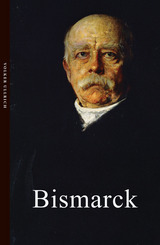
Bismarck
Volker Ullrich
Haus Publishing, 2015
Otto von Bismarck (1815–98) has gone down in history as the Iron Chancellor, a reactionary and militarist whose 1871 unification of Germany set Europe down the path of disaster to World War I. But as Volker Ullrich shows in this new edition of his accessible biography, the real Bismarck was far more complicated than the stereotype.
A leading historian of nineteenth- and twentieth-century history, Ullrich demonstrates that the “Founder of the Reich” was in fact an opponent of liberal German nationalism. After the wars of 1866 and 1870, Bismarck spent the rest of his career working to preserve peace in Europe and protect the empire he had created. Despite his reputation as an enemy of socialism, he introduced comprehensive health and unemployment insurance for German workers. Far from being a “man of iron and blood,” Bismarck was in fact a complex statesman who was concerned with maintaining stability and harmony far beyond Germany’s newly unified borders.
Comprehensive and balanced, Bismarck shows us the post-reunification value of looking anew at this monumental figure’s role in European history.
A leading historian of nineteenth- and twentieth-century history, Ullrich demonstrates that the “Founder of the Reich” was in fact an opponent of liberal German nationalism. After the wars of 1866 and 1870, Bismarck spent the rest of his career working to preserve peace in Europe and protect the empire he had created. Despite his reputation as an enemy of socialism, he introduced comprehensive health and unemployment insurance for German workers. Far from being a “man of iron and blood,” Bismarck was in fact a complex statesman who was concerned with maintaining stability and harmony far beyond Germany’s newly unified borders.
Comprehensive and balanced, Bismarck shows us the post-reunification value of looking anew at this monumental figure’s role in European history.
[more]
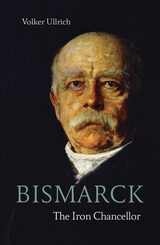
Bismarck
The Iron Chancellor
Volker Ullrich
Haus Publishing, 2021
An accessible biography of Otto von Bismarck, Germany’s first chancellor.
Otto von Bismarck (1815–1898) has gone down in history as the Iron Chancellor, a reactionary and militarist whose 1871 unification of Germany put Europe on a path of disaster leading up to World War I. But, as this new edition of his accessible biography shows, the real Bismarck was a far more complex character.
A leading historian of nineteenth- and twentieth-century history, Volker Ullrich demonstrates that Bismarck—the “Founder of the Reich”—was, in fact, an opponent of liberal German nationalism. After the wars of 1866 and 1870, Bismarck spent the rest of his career working to preserve peace in Europe and to protect the empire he had created. Despite his reputation as an enemy of socialism, he introduced comprehensive health and unemployment insurance for German workers, and he was concerned with maintaining stability and harmony far beyond Germany’s newly unified borders. Comprehensive and balanced, Bismarck shows us the value of looking anew at this monumental figure’s role in European history.
Otto von Bismarck (1815–1898) has gone down in history as the Iron Chancellor, a reactionary and militarist whose 1871 unification of Germany put Europe on a path of disaster leading up to World War I. But, as this new edition of his accessible biography shows, the real Bismarck was a far more complex character.
A leading historian of nineteenth- and twentieth-century history, Volker Ullrich demonstrates that Bismarck—the “Founder of the Reich”—was, in fact, an opponent of liberal German nationalism. After the wars of 1866 and 1870, Bismarck spent the rest of his career working to preserve peace in Europe and to protect the empire he had created. Despite his reputation as an enemy of socialism, he introduced comprehensive health and unemployment insurance for German workers, and he was concerned with maintaining stability and harmony far beyond Germany’s newly unified borders. Comprehensive and balanced, Bismarck shows us the value of looking anew at this monumental figure’s role in European history.
[more]

Black Earth
A Journey through Ukraine
Jens Mühling
Haus Publishing, 2018
An in-depth exploration of Ukraine through encounters with the many different people who live there.
“Will someone pay for the spilled blood? No. Nobody.” Mikhail Bulgakov composed this ominous and prophetic phrase in Kiev amid the turmoil of the Russian civil war. Since then, Ukrainian borders have shifted constantly, and its people have suffered numerous military foreign interventions. Ukraine has only existed as an independent state since 1991, and what exactly it was before then is controversial among its people as well as its European neighbors.
In Black Earth: A Journey through the Ukraine, journalist and celebrated travel writer Jens Mühling takes readers across the country amid the ousting of former president Viktor Yanukovych and the Russian annexation of Crimea. Mühling delves deep into daily life in Ukraine, narrating his encounters with Ukrainian nationalists and old communists, Crimean Tatars and Cossacks, smugglers, and soldiers. Black Earth connects all these stories to convey an unconventional and unfiltered view of Ukraine, a country at the crossroads of Europe and Asia and the center of countless conflicts.
In this paperback edition, a new preface is included that takes into account recent developments up to the 2022 war between Russia and Ukraine.
“Will someone pay for the spilled blood? No. Nobody.” Mikhail Bulgakov composed this ominous and prophetic phrase in Kiev amid the turmoil of the Russian civil war. Since then, Ukrainian borders have shifted constantly, and its people have suffered numerous military foreign interventions. Ukraine has only existed as an independent state since 1991, and what exactly it was before then is controversial among its people as well as its European neighbors.
In Black Earth: A Journey through the Ukraine, journalist and celebrated travel writer Jens Mühling takes readers across the country amid the ousting of former president Viktor Yanukovych and the Russian annexation of Crimea. Mühling delves deep into daily life in Ukraine, narrating his encounters with Ukrainian nationalists and old communists, Crimean Tatars and Cossacks, smugglers, and soldiers. Black Earth connects all these stories to convey an unconventional and unfiltered view of Ukraine, a country at the crossroads of Europe and Asia and the center of countless conflicts.
In this paperback edition, a new preface is included that takes into account recent developments up to the 2022 war between Russia and Ukraine.
[more]

Blair
Mick Temple
Haus Publishing, 2006
Biography of the last British Prime Minister of the 20th Century.
[more]
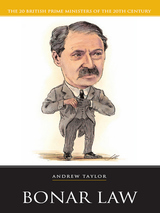
Bonar Law
Andrew Taylor
Haus Publishing, 2006
Part of the Prime Ministers Series, Law was a Conservative who opposed Home rule for Ireland
[more]

The Bonfire of The Decencies
Repairing and Restoring the British Constitution
Peter Hennessy and Andrew Blick
Haus Publishing, 2022
A reflection on the state of democracy and observance of the British constitution in the United Kingdom.
In The Bonfire of the Decencies, Peter Hennessy and Andrew Blick use Boris Johnson’s tenure as prime minister to argue that mechanisms for the upholding of constitutional principles in the United Kingdom are deficient and require an overhaul. They show that, from the outset, Johnson’s time in office was a source of serious disruption that saw standards and integrity compromised, as well as constitutional values violated. Those problems, however, did not end with Johnson’s removal from office. Rather, they are part of longer-term tendencies in the UK, and of a worrying international trend towards the weakening of democracy. Hennessy and Blick analyze the pre-existing vulnerabilities that Johnson exposed in the UK system of government and conclude with a series of proposals to repair the damage and prevent a repetition of this anxious episode in the UK’s political history.
In The Bonfire of the Decencies, Peter Hennessy and Andrew Blick use Boris Johnson’s tenure as prime minister to argue that mechanisms for the upholding of constitutional principles in the United Kingdom are deficient and require an overhaul. They show that, from the outset, Johnson’s time in office was a source of serious disruption that saw standards and integrity compromised, as well as constitutional values violated. Those problems, however, did not end with Johnson’s removal from office. Rather, they are part of longer-term tendencies in the UK, and of a worrying international trend towards the weakening of democracy. Hennessy and Blick analyze the pre-existing vulnerabilities that Johnson exposed in the UK system of government and conclude with a series of proposals to repair the damage and prevent a repetition of this anxious episode in the UK’s political history.
[more]

The Book of Doubt
Tessa de Loo
Haus Publishing, 2011
Even though he is the son of a Dutch mother, Saeed has a Moroccan first name in memory of the virtuoso oud player his mother fell in love with twenty years ago. When she found out she was pregnant, he ran off and returned to Morocco. Saeed decides to look for his father, in the hope of finding a new identity in a new world. His childhood friend Hassan accompanies him. Back then they shared an imaginary land which they both ruled. Now they only have one starting point: a grocery shop in Fez. From there they follow the trail of the oud player, who leads them from the cedar woods of Ifrane to the red dunes of the desert to the high Atlas, where Kasbahs are locked in a losing battle with decay. Saeed's search sends him deeper into disillusionment and into the arms of Islam, where he tries to find something to hold on to. But there is a disturbing presence. A seemingly fictitious character from their imaginary past infiltrates Saeed's quest. While Saeed desperately tries to get rid of him, different aspects of his life, more and more beyond his control, reach an apotheosis resulting in one final deed affecting man and beast alike.
[more]

Borges in Sicily
Journey with a Blind Guide
Alejandro Luque
Haus Publishing, 2017
When Alejandro Luque receives a book of photographs taken in Sicily by the Argentinian writer, essayist, and poet Luis Borges, he decides to trace the writer’s journey, setting off with a group of friends on his own Sicilian odyssey. Meticulously identifying the location of each photograph, Luque uses Borges’s pictures to imagine the range of emotions that the renowned writer felt as he experienced the same views. As his hunt for the locations of the original photographs unfolds, Luque chronicles the ways in which he begins to fall in love with both the island itself and with his friend, Ro.
This winding journey features literati both past and present, indigenous and foreign. These characters live alongside Luque’s own comments and observations in a narrative that is rich in historical and personal detail. The writer who inspired this great journey, Borges himself, becomes a character in this narrative that is infused with extracts and reflections from his essays and poetry. Borges in Sicily acts as a travel diary, a guide to the most fascinating places in Sicily, a recounting of Borges’s journey around the island, and a deeply poetic story of Luque’s own adventures. The book also includes twenty-three photographs from the renowned Magnum photographer Ferdinando Scianna, and it won the 1st Premio International del Libros de Viajes.
This winding journey features literati both past and present, indigenous and foreign. These characters live alongside Luque’s own comments and observations in a narrative that is rich in historical and personal detail. The writer who inspired this great journey, Borges himself, becomes a character in this narrative that is infused with extracts and reflections from his essays and poetry. Borges in Sicily acts as a travel diary, a guide to the most fascinating places in Sicily, a recounting of Borges’s journey around the island, and a deeply poetic story of Luque’s own adventures. The book also includes twenty-three photographs from the renowned Magnum photographer Ferdinando Scianna, and it won the 1st Premio International del Libros de Viajes.
[more]

Breaking Point
The UK Referendum on the EU and Its Aftermath
Gary Gibbon
Haus Publishing, 2017
As the aftermath of Brexit continues to unfold, people around the world are wondering just how Brexit happened, where post-referendum Britain is heading, and what lessons might be learned by the global community. Gary Gibbon, a preeminent political broadcaster who had extraordinary access to both sides of the campaign leading up to the referendum, explores all of these issues in Breaking Point.
Examining official and off-the-record meetings with both senior politicians and ordinary voters, Gibbon addresses tough questions that are troubling the entire European continent: Now that the United Kingdom has voted for Brexit, to what extent can it truly “leave” a set of relationships that extend to the country’s doorstep? And will the decision be a lethal blow to the European Union, perhaps spurring on copycat secession movements?
Examining official and off-the-record meetings with both senior politicians and ordinary voters, Gibbon addresses tough questions that are troubling the entire European continent: Now that the United Kingdom has voted for Brexit, to what extent can it truly “leave” a set of relationships that extend to the country’s doorstep? And will the decision be a lethal blow to the European Union, perhaps spurring on copycat secession movements?
[more]
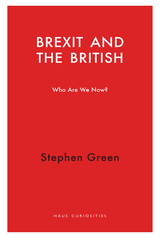
Brexit and the British
Who Do We Think We Are?
Stephen Green
Haus Publishing, 2017
Whatever the eventual outcome of Britain’s negotiations to leave the European Union, the critical questions remain: what does the Referendum vote tell us about British society? As with the election of Donald Trump in the United States, why did so few people in Britain see the result coming? Why was there such a fundamental misunderstanding about divisions in society that had existed for years?
In this short but powerful book, Stephen Green argues that it is time to acknowledge that underlying all the sound and fury of the Brexit debate were fundamental questions—whether or not fully recognized—about British identity. Are the British different, special, and capable of finding their own way in the world? Who are they, those who call themselves British? Is it all too easy to blame Brexit on post-industrial decline in the traditional heartlands of the Labor Party, or scaremongering by a band of deluded “Little Englanders”? Or is British identity more complex, deep-rooted—and perhaps, in some sense, troubling—than those of other European nations?
In this short but powerful book, Stephen Green argues that it is time to acknowledge that underlying all the sound and fury of the Brexit debate were fundamental questions—whether or not fully recognized—about British identity. Are the British different, special, and capable of finding their own way in the world? Who are they, those who call themselves British? Is it all too easy to blame Brexit on post-industrial decline in the traditional heartlands of the Labor Party, or scaremongering by a band of deluded “Little Englanders”? Or is British identity more complex, deep-rooted—and perhaps, in some sense, troubling—than those of other European nations?
[more]

Britain in a Perilous World
The Strategic Defence and Security Review We Need
Jonathan Shaw
Haus Publishing, 2014
The British government periodically publishes a Strategic Defence and Security Review, an appraisal of the armed forces that seeks to understand and prepare for the defense challenges that lie ahead. This report is often controversial—the 2010 review, for example, made headlines for all the wrong reasons, as major defense projects such as the NIMROD aircraft were discontinued at huge cost, while other projects were maintained only because they were too expensive to abandon.
In advance of the 2015 Strategic Defence and Security Review, Jonathan Shaw argues persuasively for the need to rethink how governments and Whitehall devise their strategies and reach crucial decisions. Beginning with the review’s often imprecise use of language, Shaw challenges the assumptions that underlie the British government’s current practices. Ultimately, he suggests how Whitehall can improve its approaches and, equally important, its credibility.
In advance of the 2015 Strategic Defence and Security Review, Jonathan Shaw argues persuasively for the need to rethink how governments and Whitehall devise their strategies and reach crucial decisions. Beginning with the review’s often imprecise use of language, Shaw challenges the assumptions that underlie the British government’s current practices. Ultimately, he suggests how Whitehall can improve its approaches and, equally important, its credibility.
[more]

Britten
Centenary Edition
David Matthews
Haus Publishing, 2013
Benjamin Britten was one of the outstanding British composers of the 20th century. He shot to international fame with his operas, performed by his own English Opera Group, and a series of extraordinary instrumental works. His music won a central place in the repertoire and the affection of successive generations of listeners. David Matthews brings to this biography his special insight as a fellow composer, former assistant and life-long friend of Britten to produce a uniquely personal, sensitive and authoritative account.
[more]
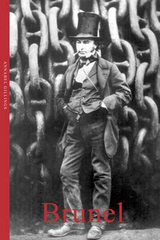
Brunel
Annabel Gillings
Haus Publishing, 2006
Isambard Kingdom Brunel was the outstanding entrepreneurial Victorian engineer. He helped construct the Thames Tunnel, build the Great Western Railway and its terminus, Paddington Station, but his boldest endeavours were three gigantic ships.
[more]

Budapest
City of Music
Nicholas Clapton
Haus Publishing, 2017
Singer Nicholas Clapton first visited Budapest to record a recently discovered mass by an almost unknown eighteenth-century Hungarian composer. There, he discovered a striking sense of otherness in spite of Hungary’s central geographical and cultural position within Europe. And with that, a deep passion for the city was born. Budapest offers an engaging and affectionate look at this beautiful capital from the perspective of a musician who lived and worked there for many years.
With rich musical traditions, both classical and folk, and possessing a language like almost no other, Hungary is in the process of abandoning the trappings of its communist past while attempting to preserve its culture from creeping globalization. Clapton delights in the fact that certain old-fashioned attitudes of courtesy, at times stemming from the very structures of the Magyar tongue, are still deeply ingrained in Hungarian society. At the same time, despite its association with world-famous composers such as Bartók, Liszt, and Kodály, music is far from an activity enjoyed only by the elite. Including plenty of tips on food, drink, and sites of interest, Budapest describes the capital in uniquely melodic terms and will delight lovers of travel and music alike.
With rich musical traditions, both classical and folk, and possessing a language like almost no other, Hungary is in the process of abandoning the trappings of its communist past while attempting to preserve its culture from creeping globalization. Clapton delights in the fact that certain old-fashioned attitudes of courtesy, at times stemming from the very structures of the Magyar tongue, are still deeply ingrained in Hungarian society. At the same time, despite its association with world-famous composers such as Bartók, Liszt, and Kodály, music is far from an activity enjoyed only by the elite. Including plenty of tips on food, drink, and sites of interest, Budapest describes the capital in uniquely melodic terms and will delight lovers of travel and music alike.
[more]

Building a New World Order
Sustainable Policies for the Future
Harald Müller
Haus Publishing, 2009
Building a New World Order: Sustainable Policies for the Future demonstrates how the conditions for sustainable development might be created, and why all our futures are dependent on a global engagement and involvement, not just that of a few selected statesmen.
[more]
READERS
Browse our collection.
PUBLISHERS
See BiblioVault's publisher services.
STUDENT SERVICES
Files for college accessibility offices.
UChicago Accessibility Resources
home | accessibility | search | about | contact us
BiblioVault ® 2001 - 2024
The University of Chicago Press









